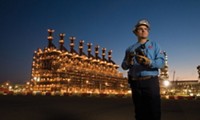Advertisement
Grab your lab coat. Let's get started
Welcome!
Welcome!
Create an account below to get 6 C&EN articles per month, receive newsletters and more - all free.
It seems this is your first time logging in online. Please enter the following information to continue.
As an ACS member you automatically get access to this site. All we need is few more details to create your reading experience.
Not you? Sign in with a different account.
Not you? Sign in with a different account.
ERROR 1
ERROR 1
ERROR 2
ERROR 2
ERROR 2
ERROR 2
ERROR 2
Password and Confirm password must match.
If you have an ACS member number, please enter it here so we can link this account to your membership. (optional)
ERROR 2
ACS values your privacy. By submitting your information, you are gaining access to C&EN and subscribing to our weekly newsletter. We use the information you provide to make your reading experience better, and we will never sell your data to third party members.
Business
Another ethylene plant to rise on the Gulf
Total, Nova, and Borealis plan to spend $1.7 billion on a project in Texas
by Alexander H. Tullo
March 29, 2017
| A version of this story appeared in
Volume 95, Issue 14

In yet another petrochemical venture meant to take advantage of cheap U.S. shale gas, French oil giant Total is joining with Canada’s Nova Chemicals and Austria’s Borealis to build a $1.7 billion ethylene cracker and a polyethylene plant, both in Texas.
The cracker will have 1 million metric tons per year of capacity. It will be located in Port Arthur, adjacent to a Total refinery and an ethylene cracker joint venture that Total and BASF started up in 2001.
The polyethylene plant, in Bayport, will have 625,000 metric tons of capacity and will be based on Borealis’s Borstar technology. The three-way partnership will also include a 400,000-metric-ton-per-year polyethylene facility in Bayport that Total currently owns and operates.
Total, which will own half of the venture, has been contemplating the ethylene cracker since 2013 and has permits in hand from the Texas Commission on Environmental Quality. The companies expect to make a final investment decision by the end of the year and hope to commission the ethylene unit in 2020.
Total says the project complements upstream investments it has made in shale gas extraction and liquefied natural gas.
For Nova, the investment is an opportunity to break out of Canada, home to all of its olefin-related operations. It is also a chance to embark on a major project with Borealis, which, like Nova, is controlled by Abu Dhabi’s International Petroleum Investment Co.
Petrochemical makers are starting up a spate of new ethylene crackers on the U.S. Gulf Coast. Dow Chemical just announced it wrapped up construction of its project in Freeport, Texas. Chevron Phillips Chemical and ExxonMobil are slated to complete their projects later this year. The Total joint venture is part of a second wave of projects that would open early in the next decade.
Another second-wave project, a joint venture between ExxonMobil and Saudi Basic Industries, is nearing the end of its site selection process. After considering sites in Texas and Louisiana, the partners have settled on San Patricio County, Texas, near Corpus Christi, as the leading candidate.
Although the partners have won tax breaks for the plant, they face opposition from residents hostile to large-scale industrial development.



Join the conversation
Contact the reporter
Submit a Letter to the Editor for publication
Engage with us on Twitter